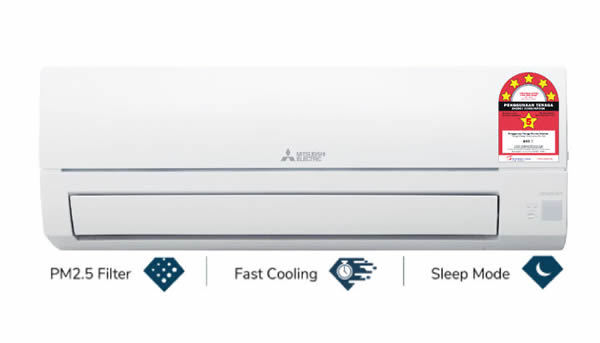
Are you in the market for a new air conditioner? If so, you may be wondering whether you should buy an inverter or non-inverter model. Both have their pros and cons, and it can be tough to decide which one is right for you. This blog post will discuss the pros and cons of inverter and non-inverter air conditioners and help you decide which one is right for your home or business.
What Is An Inverter Air Conditioner, And How Does It Work?
An inverter air conditioner is a type of air conditioner that uses an inverter to regulate the compressor’s speed. The inverter is a device that converts direct current (DC) into alternating current (AC). Inverters are used in a variety of devices, from computers to solar panels. In an inverter air conditioner, the inverter is used to regulate the compressor’s speed. This allows the air conditioner to cool the air more efficiently by only using as much power as needed. Learn more about air conditioner parts here.
Advantages Of Inverter Acs
Inverter ACs have many advantages over traditional ACs. One advantage is that inverter ACs are much more efficient. They use less energy to cool a room and maintain a consistent temperature, which traditional ACs cannot do. Inverter ACs are also much quieter than traditional ACs. They produce very little noise, and they can even be used in bedrooms without disturbing sleep.
Finally, inverter ACs have a longer lifespan than traditional ACs. They are built to last longer and withstand more wear and tear. Inverter ACs are the best choice for cooling a home or office for all these reasons.
Disadvantages of Inverter ACs
While inverter ACs are becoming increasingly popular, there are a few disadvantages to consider before making the switch. One downside is that inverter ACs tend to be more expensive than traditional ACs. In addition, inverter ACs can be less reliable, as they rely on complex electronic components that can break down more quickly. Overall, inverter ACs have a few potential drawbacks that you should consider before making your purchase.
Pros and Cons of Non-Inverter Air-cond
There are a few things to consider before purchasing a non-inverter AC. One advantage is that they tend to be more affordable than inverter ACs. Another advantage is that they’re easier to install and maintain. However, non-inverter ACs have a few disadvantages too.
One is that they’re not as energy efficient as inverter ACs. This means that they’ll end up costing you more in the long run. Another disadvantage is that they’re not as good at regulating temperature, so you may find yourself feeling colder or hotter than you’d like.
Which One Is Right For You – The Inverter Or The Non-Inverter Air Conditioner?
Now that you know the pros and cons of inverter and non-inverter ACs, it’s time to decide which one is right for you. Inverter ACs are more efficient, quieter, and longer-lasting than traditional ACs. If these factors are important to you, then an inverter AC is the best choice. Non-inverter ACs are more affordable and easier to install, but they’re not as energy efficient as inverter ACs.
If these factors are important to you, then a non-inverter air conditioner may be the best choice for you. Ultimately, the decision comes down to what’s most important to you. Compare the two types and decide which one is right for you, based on your needs and budget.
Common FAQ about inverter AC
Does inverter AC have high maintenance?
No, inverter AC has low maintenance. In fact, they have a longer lifespan than traditional ACs.
Is it cheaper to leave the inverter AC on?
Inverter ACs are a great way to save money on your energy bill, but only if you use them properly. Many people mistakenly believe that they should be turned on all the time to save money. However, this is not the case. Inverter ACs are designed to be used for extended periods of time, not turned on and off throughout the day.
If you use your inverter AC for 2 hours, then turn it off for 2 hours, you will actually use more energy than if you had just left it on for 8 hours straight. Inverter ACs are most efficient when used uninterrupted, so make sure to use them accordingly to maximize your savings.
Can I use an inverter AC in a business?
Yes, you can use an inverter AC in a business. In fact, they’re often used in office buildings and other commercial spaces. They’re quiet and efficient, making them a good choice for businesses of all sizes.
Can inverter AC run 24X7?
No, inverter ACs are not meant to run 24X7. They are designed to run for long periods of time but should be turned off occasionally to allow the components to cool down.
What is the benefit of dual inverter AC?
Dual inverter ACs are more efficient than single inverters because they can cool two rooms at once. If you have a large home or office, a dual inverter AC is the best choice for you.
Final Thought
Air conditioners are a necessity during the summer months, but it can be tough to decide which type is right for you. This blog post discussed the pros and cons of inverter and non-inverter ACs and helped you decide which one is the best aircond for your home or business.
Inverter ACs are more efficient, quieter, and longer-lasting than traditional ACs, while non-inverter ACs are more affordable and easier to install. Ultimately, the decision comes down to what’s most important to you. Compare the two types and decide which one is right for you, based on your needs and budget.
Last Updated on
- How to clean standing fan easily - September 24, 2022
- How Long Does a Fan Last? – Electric fan Maintenance Guide - September 23, 2022
- Can electric fans be left on 24 hours a day? - September 23, 2022
